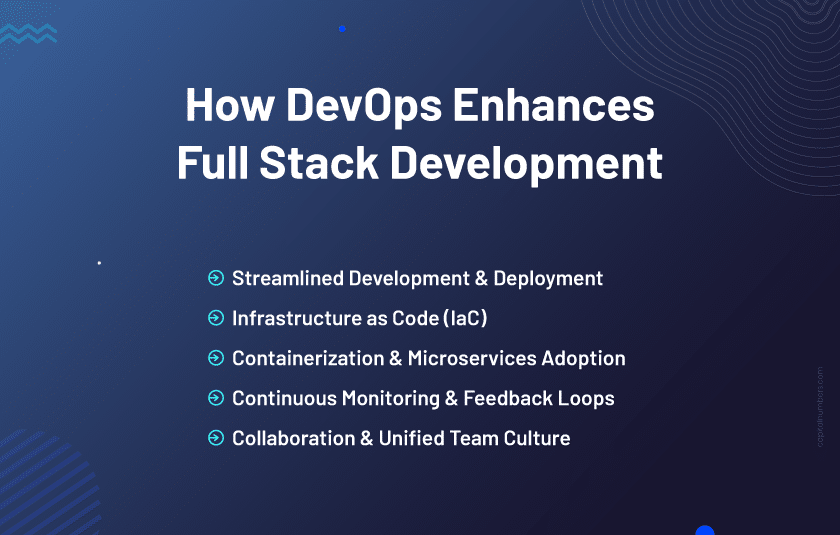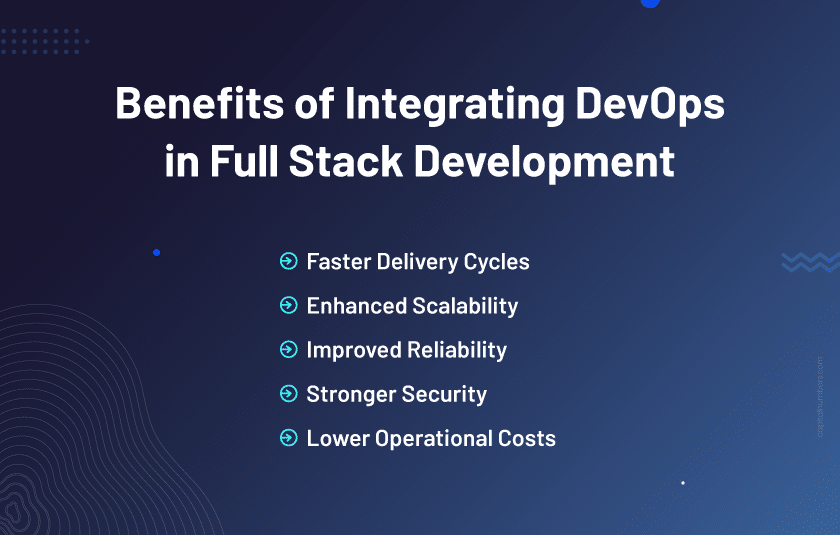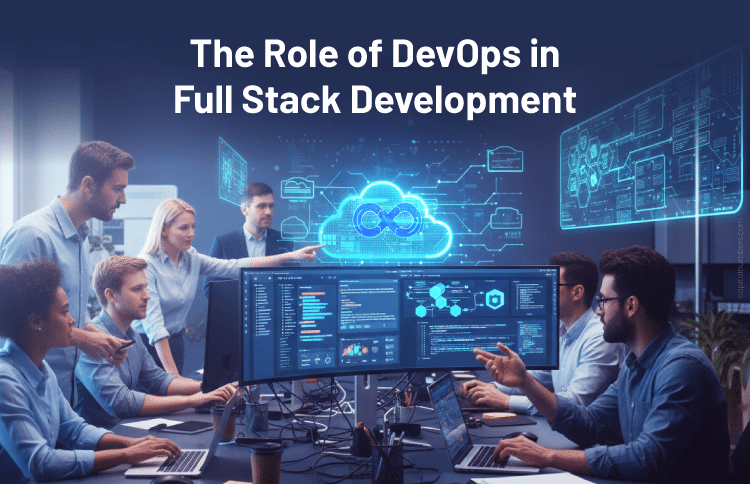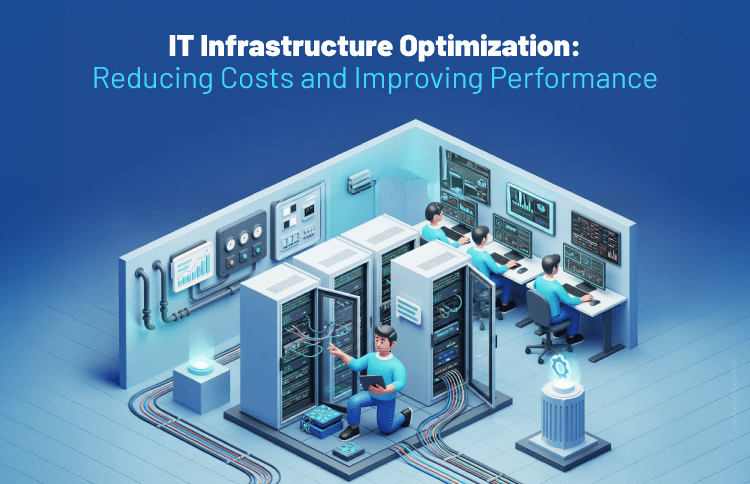The Role of DevOps in Full Stack Development
Table of Contents
The software industry is undergoing a significant transformation driven by the demand for faster releases, higher reliability, and seamless user experiences. Full Stack Development has played a central role in this shift by enabling developers to work across both frontend and backend layers of an application. However, as applications scale and environments become more dynamic, it becomes increasingly difficult to maintain speed, quality, and consistency using traditional development practices.
This is where DevOps adds tremendous value. DevOps is not just a set of tools, but a cultural and technical movement that integrates development and operations to improve collaboration, automate workflows, and streamline the entire software delivery lifecycle. When DevOps principles are combined with full stack development, organizations achieve faster releases, better stability, and highly scalable solutions.
Understanding Full Stack Development
Full stack development involves working across all layers of an application, including:
- Frontend: Designing user interfaces using technologies such as HTML, CSS, JavaScript, and component-based frameworks.
- Backend: Managing business logic, APIs, authentication mechanisms, and server-side processes.
- Databases: Handling structured and unstructured data using systems like MySQL, PostgreSQL, or MongoDB.
- Infrastructure: Deploying applications on servers, cloud platforms, and managed services.
Modern full stack developers must understand not only how to write application logic but also how the system behaves in production environments. They frequently deal with performance optimization, application security, version control, and various deployment strategies.
This broader skill set aligns naturally with DevOps, which aims to improve the entire application lifecycle from coding to production monitoring.
What is DevOps and Why It Matters
DevOps is a set of cultural values and technical practices that break down the traditional barriers between software development and IT operations. Instead of working in isolated silos, DevOps encourages teams to collaborate, automate processes, and deliver updates continuously.
Key DevOps principles include:
- Continuous Integration (CI): Merging code frequently and validating it through automated testing to detect issues early.
- Continuous Delivery (CD): Automating application deployments to ensure rapid and safe releases.
- Infrastructure as Code (IaC): Defining and managing infrastructure using code for consistency and repeatability.
- Continuous Monitoring: Observing system performance and errors in real time to improve reliability.
- Shared Ownership: Encouraging collaboration between development, operations, and QA teams.
These practices ensure that applications are delivered faster, with fewer errors, and with far more resilience.
How DevOps Enhances Full Stack Development

-
Streamlined Development and Deployment
CI/CD pipelines automate integration, testing, and deployment activities. This allows full stack developers to deliver changes to both frontend and backend components without manual intervention. Automatic builds and tests ensure that code issues are detected early, reducing rework and enhancing productivity.
-
Infrastructure as Code (IaC)
Full stack developers often work in multiple environments – development, staging, and production. IaC tools make it possible to define the infrastructure once and deploy it identically across all environments. This prevents configuration drift, reduces human error, and allows teams to create scalable infrastructures quickly.
-
Containerization and Microservices Adoption
Containers provide consistent environments for running applications. Full stack developers can package their entire applications – including dependencies – into lightweight containers that run uniformly across systems. Microservices further break large applications into smaller, independently deployable services. This improves scalability and allows teams to update specific features without affecting the entire application.
-
Continuous Monitoring and Feedback Loops
Monitoring is essential for understanding the performance and health of applications. DevOps incorporates monitoring tools that provide real-time insights into frontend response times, backend processing, and database performance. This helps developers identify bottlenecks early and improve the overall user experience.
-
Collaboration and Unified Team Culture
DevOps encourages teams to work together throughout the development and deployment process. This culture of shared responsibility enables full stack developers to collaborate with operations engineers, testers, and security teams more effectively. This collective approach reduces misunderstandings and accelerates problem-solving.
You May Also Read: Streamline Development and Deployment with Containerization: A Complete Guide
Real-World Workflow in a DevOps-Enabled Full Stack Environment
A typical workflow in a DevOps-enabled full stack setup looks like this:
- Developers push code to a shared repository.
- A CI system triggers automated tests and builds.
- Applications are packaged into containers using standardized configurations.
- CD pipelines deploy the updated components to the target environment.
- Infrastructure provisioning is automated using IaC templates.
- Monitoring tools track usage, performance, and logs.
- Alerts notify teams of errors, anomalies, or security threats.
- If issues occur, rollback mechanisms ensure quick recovery.
This end-to-end automation helps teams deliver changes faster, maintain stability, and minimize downtime.
Benefits of Integrating DevOps in Full Stack Development

- Faster Delivery Cycles: Automation reduces manual work and accelerates every stage of development, from writing code to deploying applications.
- Enhanced Scalability: Cloud platforms and orchestration tools allow applications to scale automatically based on demand. This ensures smooth user experiences during peak traffic.
- Improved Reliability: Continuous monitoring, automated rollbacks, and proactive incident response significantly reduce downtime and ensure system stability.
- Stronger Security: DevOps incorporates security scanning at various stages of development, ensuring vulnerabilities are detected and fixed earlier.
- Lower Operational Costs: Automating repetitive tasks reduces manual overhead and the risk of human errors, making the entire process more cost-efficient.
Challenges in Adopting DevOps for Full Stack Teams
While DevOps brings numerous advantages, organizations may face certain challenges during adoption:
- Skill Gap: Full stack developers must become familiar with CI/CD pipelines, cloud platforms, and automation tools.
- Tool Complexity: Managing multiple tools can be overwhelming without proper governance.
- Cultural Resistance: Shifting from isolated roles to shared ownership requires mindset changes.
- Security and Compliance: Automated workflows must still comply with regulatory guidelines and data protection requirements.
With proper training, a phased adoption strategy, and leadership support, these challenges can be effectively addressed.
The Future: DevOps, Full Stack, and AI
The future of DevOps is strongly influenced by AIOps, where AI and machine learning enhance operational efficiency. AI-driven systems can analyze logs, monitor metrics, predict failures, automate scaling, and optimize CI/CD pipelines.
Full stack developers who embrace DevOps and AI will be able to build intelligent, self-healing systems capable of addressing issues autonomously. This combination will redefine the standards for reliability and performance in cloud-native environments.
Conclusion
DevOps has become an essential component of modern full stack development. By promoting automation, collaboration, and continuous delivery, DevOps enables development teams to focus on innovation rather than operational challenges. Full stack developers equipped with DevOps skills can build applications that are scalable, resilient, and aligned with business needs.
In a digital landscape where speed and reliability are critical, DevOps is not just beneficial – it is indispensable. It serves as the backbone of modern software development, empowering teams to deliver high-quality user experiences with confidence and consistency.


















